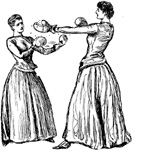
On Women’s Liberation
HARVARD DIARY
My wife and I have spent over two decades talking with American families of various kinds, and we’ve certainly seen some awful instances of injustice connected with gender difference. We have seen women work long and hard for meager wages — often doing the same work as men, but paid substantially less. We have seen all sorts of discrimination, prejudice, and plain mean-spiritedness inform the way employers and, sad to say, husbands and fathers have treated women — to use W.H. Auden’s phrase, “a whole climate of opinion”: women belong here, are suited only for this, shouldn’t be allowed to go there or do that. Is there really any argument any more over the economic disparities, the educational restrictions and inequities that have been the burden of America’s women — among others elsewhere in the world — for so very long? In my medical school class there were four women; now, in the medical school classes I teach, there are dozens and dozens of women, and they are fine students, and make decent, caring physicians. So it has gone in other professions — from severe limitations, if not outright exclusion, to a gradual and (of late) more vigorous spirit of acceptance.
The issue now is not (one hopes and prays) whether women “deserve” equal pay for equal work, or “deserve” entry into the professions or access to jobs in companies or institutions once unwelcoming. The issue is now a much broader, cultural one: the so-called role of women in this life, and just as important, the role of men as well. Here we come to a highly complicated matter which has people of honorable intention at serious odds (I need not mention the demagogues on both sides). For it is hard to know how much of our “nature” as individuals has to do with our biological make-up, and how much is a consequence of our experiences, including the early years of childhood. This “nature-nurture” polarity will perhaps never lend itself to mathematical formulation — but it does seem foolish to exclude either of those two broad aspects of influence, and it does seem that some individuals and groups tend to side in almost a creedal fashion with one or the other: our inherited constitutional disposition as against our accumulation of learned expectations.
Of course, even the explicitly psychological qualities children learn at home and school and in the neighborhood are often a source of additional polarization, as my wife and i have come to realize again and again in the course of our work: children are taught, at different times, to be tough, fiercely competitive, highly acquisitive, “hard as nails,” insistently active, and assertively outgoing — and also to be gentle, companionable, friendly, caring, warmly sensitive, quiet and tactful and patient and generously giving. Many of the above qualities have become sorted out, in the minds of millions of us, as connected to sexuality — masculine in nature, feminine in nature. And yet, in many of us these traits in various combinations (and sometimes uneasily, or in outright conflict) manage to exist side by side.
The controversy comes when each of us declares our sense of how those various qualities (which are at once psychological and spiritual) ought be encouraged to sort themselves out — what relative balance in which people. Oh, to be sure, one can say: the same ideal mix, never to be perfectly realized, is what everyone should seek. Yet, no society is without a division of labor. Even in utopian communes different people have chosen or been asked to do different deeds. As for the Bible (both the Old and New Testaments), it offers plenty of evidence of angry, war-like postures and utterly tranquil and accepting postures, of toughness in the name of God and of mild acquiescence in the name of God. Jesus could be as kindly and embracing as the human mind can imagine, and He could be demanding, argumentative, irritated, ready to take on His opponents. As for our babies, our growing children, I don’t think there is too much disagreement about their various requirements: at different times in their lives they are in need of receiving a wide range of encouragement from their parents and others, who must show them how to love (by the example of being loved, needless to say), and how to be kindly and thoughtful — but also how to stand up for themselves and take care of themselves and learn a certain forceful independence and assertive individuality of spirit.
You May Also Enjoy
"Money is power." And, boy, do these feminists want money.
The Vatican just wants to see Catholic nuns abiding by the norms of the Church without undermining her teachings or thumbing their noses at legitimate religious authority. Is this a surprise?
I am tired of watching ministers or priests mouth psychiatric pieties, when “hard praying” is what the particular human being may want, and yes, urgently require.

